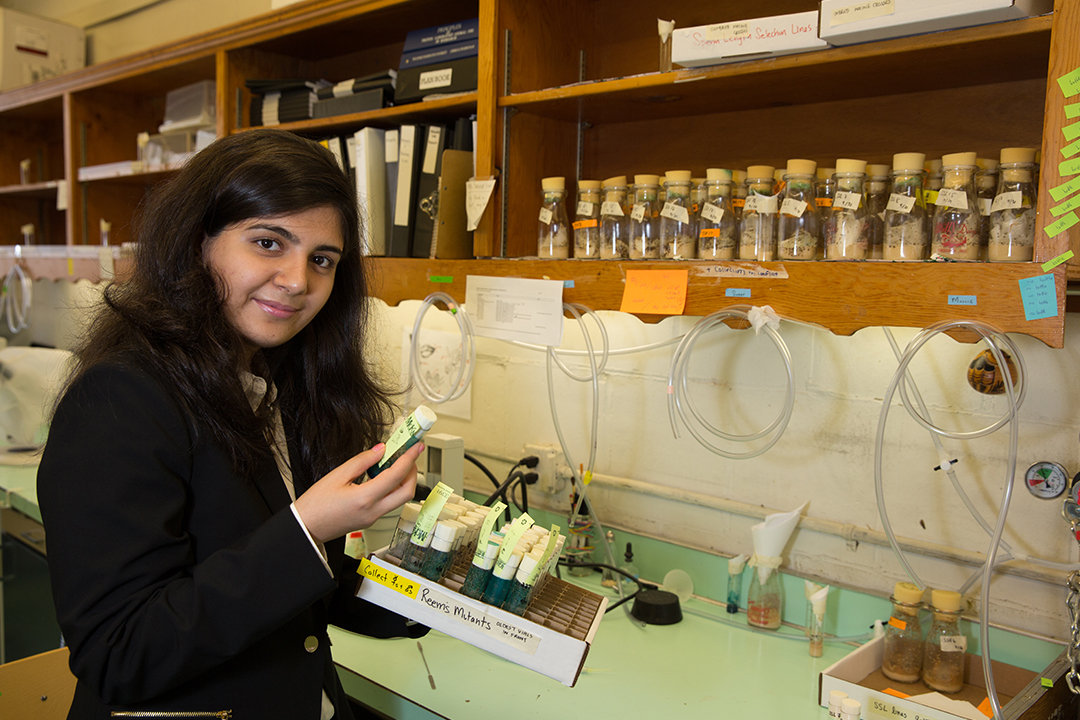By John DiConsiglio
When Reem Al Shabeeb thinks back on her childhood in Iraq, a stream of conflicting images comes to her mind: Her families New Year’s celebrations, with plates of her mother’s lamb kebobs and dolma leaves. Bingo games with friends at Baghdad social clubs, while the grown-ups drank coffee and discussed politics in hushed tones. Afternoons splashing in resort hotel swimming pools to escape the stifling summer heat.
But just as quickly, visions of an idyllic youth are pushed aside by darker scenes of violence and bloodshed: Deafening explosions leveling buildings during the 2003 American-led invasion. Bullet holes chipping her home’s stone façade and shrapnel landing in her front-yard garden. Sirens that seemed to wail endlessly through the night.
“No one misses Iraq,” said Reem, a second-semester freshman biology major whose family fled Baghdad in 2009 when Reem was 14. “It seems like you are having a normal childhood, with your family, your friends, your school. But you look back and there are things you wish you could forget.”
Today, Reem has other matters on her minds, mostly involving white laboratory coats, microscopes and scalpels. As a research assistant in Assistant Professor Mollie Manier’s biological sciences lab, her responsibilities include dissecting fruit flies to examine their reproductive systems—great training for Reem’s goal to become a brain surgeon.
And her professor couldn’t be more impressed. “Reem has the rare ability to think creatively and independently,” said Manier. “And she’s so enthusiastic. She’s the lab cheerleader.”
For Reem, the youngest of Manier’s seven student research assistants, the lab can be a sort of escape, a place to lose yourself in formulas and experiments. Given the turmoil of her childhood, contemplating questions of molecular evolution and behavioral ecology are easier than thinking about her past. “There’s something about science, seeing how neatly things work and interact with each other, that makes me feel like I can understand all that’s happened in my own life,” she said. “If I can figure out what’s going on inside a fruit fly, it shouldn’t be hard to make sense of the things I’ve seen.”
A Childhood under Fire
As a child in Baghdad, Reem had no idea she was living in a dictatorship. The extent of her knowledge about Saddam Hussein came from lessons in her first grade class, where mornings began with a loyalty pledge to the despotic ruler. Her parents, both doctors, never discussed politics in front of her. She had no way of knowing that, like all physicians and other professionals, they were barred from leaving the country. “As far as I was concerned, they just went to work at the hospital each day, like anybody going off to a job,” Reem recalled.
Reem was just seven when the invasion began. Suddenly her parents had a new set of worries—like how to make it home from their uncle’s before curfew or where to seek shelter when the warning sirens sounded. When bombs rained on Baghdad, Reem’s family huddled in a back bedroom, away from shattering windows. Reem remembers her annoyance over missing Lizzie McGuire reruns after the TV stations were bombed.
When her school reopened, Reem’s class tore pictures of Saddam from their textbooks. Some of the desks around her were empty. Classmates had been cut off from the rest of the city and couldn’t make their way back to the school. Others had left Baghdad altogether. Still others were never heard from again.
In 2006 and 2007, when Reem was nine, Iraq was arguably the most dangerous place on earth. As many as 3,000 Iraqis a month were killed amid sectarian violence. Twice, Reem’s school day was interrupted by gunfire, forcing her class under desks to escape a crossfire of bullets. She regularly heard bomb-blasts nearby—once so close that she remembers her milk glass shaking from the aftershocks. The sight of troops with guns was so ubiquitous that she often confused the words “American” and “soldier.”
Still, Reem said she became accustomed to growing up in a war zone. The shootings, the explosions, walking past the rubble of razed buildings on her way to school—all were soon commonplace. “My whole life was going to school, studying hard and getting home as quickly as I could,” she said. “Sometimes I’d cry about why my life was like that. But mostly, everything felt normal.”
At the height of the violence, professionals like Reem’s parents were sometimes targeted for kidnappings and assaults. When fellow doctors saw their children abducted or killed, Reem’s family decided it was time to leave the country. They packed in secret and warned 14-year-old Reem not to tell a soul—a vow she quickly broke when she asked her best friend for a farewell photo.
The family’s first stop was Malaysia, one of the few countries that welcomed Iraqi immigrants without visas. They soon moved to Jordan and, two years later, settled in Silver Spring, MD. At 17, Reem had little trouble fitting into her American high school. Classwork came easy to her. “In [the Middle East], we memorized textbooks and spent whole days studying to pass our exams,” she said. “In the U.S., it’s more important to understand your lessons than to memorize them. And homework doesn’t take up all your time.”
Reem chose to attend GW partly because of its diverse student body—although she has never met another Iraqi student on campus. She rarely talks about her past. She never discusses her opinions on U.S.-Iraqi policy. And most of her friends don’t even know that she’s a proud observant Muslim. “It’s not like I walk around saying, ‘I pray five times a day and it’s great to fast at Ramadan,’” she said. “I focus on what I have in common with other people. I don’t spend much time thinking about Iraq. I’m too busy thinking about fruit flies. ”


